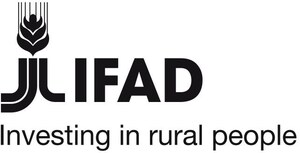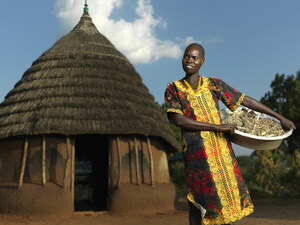Food from healthy farms makes healthy people - New IFAD report
ROME, Oct. 10, 2017 /PRNewswire/ -- Investing in climate-resilient agriculture not only improves food security but contributes to eradicating malnutrition, according to the findings of a new report from the International Fund for Agricultural Development (IFAD).
The Nutrition Advantage – Harnessing the Nutrition Co-Benefits of Climate Resilient Agriculture, a study of IFAD's experience in improving nutrition in climate-sensitive agricultural investments, shows that climate change impacts in agriculture and the prevalence of malnutrition in rural areas are deeply intertwined.
For those living on land that is increasingly degraded, or at risk due to greater climate variability, what is grown is not as rich in nutritious content as it could be, which has implications for rural and urban populations alike," said IFAD President Gilbert F. Houngbo
The research also points to the urgent need to sensitize farmers to spending their hard-earned income on more nutritious food choices which lead to better health outcomes for the whole family. Income-raising activities are also crucial to allow families to buy the food they do not grow themselves. Paired with nutrition education, the report shows the positive economic and nutritional benefits of a diversified approach.
"Promoting diversified, climate-smart food systems that take nutritional considerations into account can help smallholders to be more resilient, provide more stable incomes and improve dietary quality, while at the same time addressing climate change," said Margarita Astralaga, Director of IFAD's Environment and Climate Division.
The report points to examples of where IFAD is working on exactly this kind of multiple benefit investment. In Sudan, an IFAD-supported project on irrigation and land and water governance offered training on nutrition and food processing. Among the outcomes, women taking part learned about the nutritional benefits of less commonly consumed foods, such as vegetables, eggs and milk. They also learned how to prepare more nutritious dishes, the importance of good hygiene, as well as the benefits of a balanced diet.
In Niger, in response to a harsh climate and land degradation, the IFAD-supported Family Farming Development Programme works with women's groups to increase the availability of staple foods during the lean season and the production of foods with high nutritional value. Activities such as grain stores for women and "nutrition gardens," are emphasized to help promote resilience to climate shocks.
"At IFAD we are determined to shore up climate resilience in our projects and create opportunities to integrate nutrition concerns, ensuring that we address the complex interlinkages between climate change, nutrition and agriculture in a holistic way," Astralaga added.
For a copy of the Nutrition Advantage Report please click here.
For more about IFAD. Join us on Facebook, Twitter, LinkedIn, Instagram and YouTube
Contact: Brian Thomson, mobile +39 3666121101, email [email protected]
IFAD invests in rural people, empowering them to reduce poverty, increase food security, improve nutrition and strengthen resilience. Since 1978, we have provided about US$18.9 billion in grants and low-interest loans to projects that have reached some 470 million people. IFAD is an international financial institution and a specialized United Nations agency based in Rome – the UN's food and agriculture hub. For more information visit www.ifad.org Press release No.: IFAD/56/2017
SOURCE International Fund for Agricultural Development
Related Links
WANT YOUR COMPANY'S NEWS FEATURED ON PRNEWSWIRE.COM?
Newsrooms &
Influencers
Digital Media
Outlets
Journalists
Opted In






Share this article